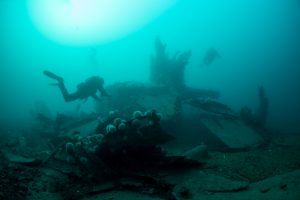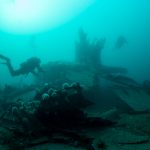

Scapa Flow German High Seas Fleet scrap sites explored

(Picture: UHI Archaeology Institute / Bob Anderson)
A team of marine archaeologists have completed a dive on the German High Seas Fleet scrap sites in Scapa Flow.
The marine archaeologists from Orkney Research Centre for Archaeology (ORCA), the University of the Highlands and Islands Archaeology Institute and colleagues from SULA Diving completed a dive on the German High Seas Fleet scrap sites last Friday, February 17.
The team sailed out into Scapa Flow, on board local dive boat MV Halton to complete the second phase of the German High Seas Fleet Scrap Sites project.
Sandra Henry, marine archaeologist for ORCA, said: “We concentrated on sites located through side scan sonar survey completed in phase one and we recorded and documented extensive remains of the First World War fleet that still lie on the seabed.
“The conditions underwater were perfect and visibility was good, allowing the divers to take some excellent photographs and video footage while recording and surveying the wreckage left behind following the inter-war salvage efforts on the scuttled German High Seas Fleet.”
Archival research will shed further light on the debris itself and will identify from which ships the wreckage originated.
The salvaging of the German High Seas Fleet in the 1920s-40s raised battleships, battlecruisers and destroyers from the seabed for scrapping at dockyard sites further south such as Rosyth.
Today the remains of these ships and their associated salvage lie on the seabed, continuing to tell the story of the High Seas Fleet in Scapa Flow, adding to the story, and creating an interesting heritage resource.
The project is designed to showcase the significant wreckage of the scrap sites of the German High Seas Fleet and was conducted on behalf of Historic Environment Scotland.